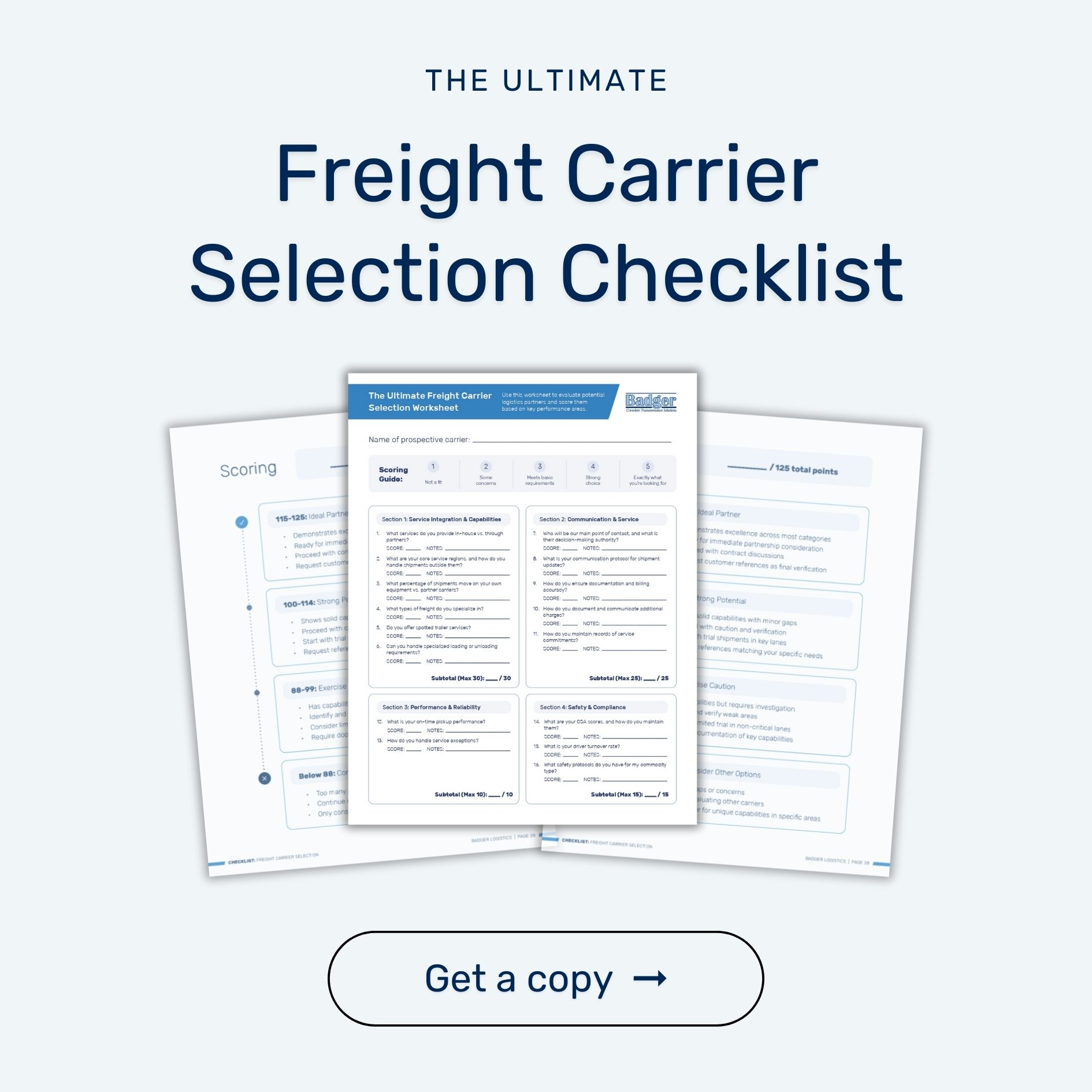Choosing the right freight carrier is one of the most consequential business decisions you'll make. Get it right, and your supply chain runs smoothly. Get it wrong, and you're facing delays, damaged freight, and a never-ending stream of frustrating conversations that go nowhere.
After decades in this industry, I've seen too many shippers chase the lowest rate only to wonder why their freight is late, damaged, or stuck in limbo. The truth? The right carrier isn't just the one with the cheapest bid—it's the one that actually does what they say they will.
We've compiled the most critical questions you should ask any potential freight carrier before signing on the dotted line. These come from real-world experience working with hundreds of shippers across countless industries.
1. What services do you provide in-house versus through partners?
Many carriers claim to handle everything themselves, but that's rarely the case. A transparent carrier will clearly explain which services they control directly and how they manage outside partners.
Be cautious of carriers who are vague about which services are truly internal versus partnered, as this often leads to inconsistent service quality.
2. How do you handle service exceptions?
Things don't always go according to plan—that's just logistics. What separates good carriers from bad ones is how they handle problems when they arise.
Look for a carrier with a clear, structured escalation process but still flexible enough to adapt to unique situations. Be wary of carriers who claim they "rarely" have issues—that usually means they aren't prepared when things go wrong.
3. What is your on-time pickup performance?
Most carriers talk about delivery performance, but if they can't pick up on time, your whole operation falls apart. Ask for specific pickup performance metrics separate from delivery statistics.
Strong carriers track pickup performance meticulously and maintain near-perfect reliability. If they lump pickup and delivery metrics together or give vague answers, expect scheduling headaches.
4. Who will be our main point of contact, and what is their decision-making authority?
Your point of contact can make or break your experience. If they don't have authority to make decisions, you'll waste time chasing approvals.
A good carrier will tell you exactly who handles your account, what decisions they can make independently, and how escalations are managed. Avoid carriers buried in layers of approval processes.
5. What are your CSA scores, and how do you maintain them?
CSA scores provide an objective way to measure a carrier's safety and operational standards. A reputable carrier won't hesitate to share their scores and should explain how they compare to industry averages.
Be extremely wary of carriers that dodge this question or try to downplay their scores. If they blame bad scores on factors outside their control, that's a major red flag.
6. What is your driver turnover rate?
The industry average driver turnover exceeds 100%, meaning many carriers replace their entire driver workforce every year. This directly impacts service consistency.
Ask carriers about their turnover rate and what they do to retain quality drivers. Companies with lower turnover rates typically invest in driver satisfaction through competitive pay, better equipment, and work-life balance considerations.y failures are inevitable. Recovery processes determine their impact.
7. What safety protocols do you have for my commodity type?
A "generic" safety program isn't sufficient. Strong carriers develop specific safety protocols for different freight types, covering training, equipment requirements, and risk management strategies. Watch for carriers who give vague answers or seem unfamiliar with your commodity's specific handling requirements.
8. How do you document and communicate additional charges?
Unexpected charges are one of the biggest sources of friction in logistics relationships. Trustworthy carriers have clear, upfront processes for explaining extra costs before they appear on your invoice.
They should walk you through how they handle detention, fuel surcharges, and other potential fees. Be cautious with carriers who seem vague about their charge policies.

9. What are your warehousing capabilities and certifications?
If a carrier offers warehousing, they should provide specific details about their facility: square footage, number of docks, certifications, and inventory management processes.
Ask about lot tracking, FIFO procedures, and how they handle product segregation. Beware of carriers that treat warehousing as just renting space without proper processes.
10. How do you maintain records of service commitments?
Service commitments should be more than just words. A carrier needs structured systems for tracking agreements, handling requirements, and performance benchmarks.
Without formal documentation, service inconsistencies and broken promises are almost guaranteed.
11. What is your approach to rate management?
Rates reveal a lot about a carrier's long-term reliability. Transparent carriers explain how they calculate both contract and spot rates, including fuel surcharges and accessorials. They balance competitive pricing with sustainable rates that support quality service.
Watch for carriers who promise the lowest rates but aren't clear about surcharges or extra fees.
12. How do you handle after-hours issues?
Freight problems don't stop at 5 p.m. Strong carriers have real decision-makers available 24/7—not just an answering service.
Ask who handles after-hours emergencies, their level of authority, and typical response times. Be cautious of carriers who rely on junior staff for after-hours support or lack direct contact options.
13. What is your claims process?
Every carrier has claims—it's how they handle them that matters. Good carriers have clear prevention strategies and structured resolution processes, including dedicated personnel, specific timeframes, and documented procedures.
Be wary of carriers who claim they "never" have claims or get defensive when asked about their process.
14. How do you manage seasonal volume fluctuations?
Seasonal surges test a carrier's planning abilities. Strong carriers have strategies for maintaining service levels during peak times while ensuring capacity during slower periods.
They should explain how they prioritize customers and plan for high-demand periods. Be cautious of carriers who act like seasonal changes are no big deal or claim they can always "find capacity."
15. Do your tracking systems integrate with what we need?
Technology should work for you, not force you to adapt to the carrier's systems. Good carriers provide tracking in multiple formats to fit your operation—whether that's automated updates, email alerts, or personal calls.
Avoid carriers who insist you must use their portal or can't explain how they integrate with customer systems.
Get the Complete Checklist
These 15 questions are just the start. Our comprehensive Freight Carrier Selection Checklist includes 25 essential questions, detailed explanations of what to look for in responses, and a scoring system to objectively evaluate potential carriers.

Download our complete checklist to:
- Ask the right questions before committing to a freight carrier.
- Know exactly what to look for in their answers.
- Identify red flags that signal future problems.
- Score potential carriers objectively.
- Make a data-driven carrier selection that will benefit your business.
Don't leave your freight carrier selection to chance. Get our expert guide and make an informed decision that will keep your supply chain running smoothly.
Talk to us when you need the precise logistics to efficiently move freight so you can focus on your core business.








